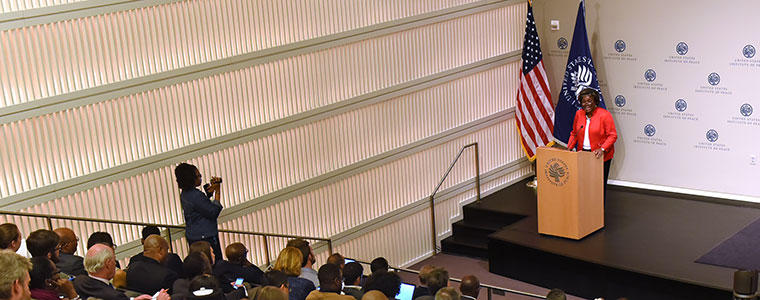Partnership with Nigeria: the U.S. View
Assistant Secretary of State Linda Thomas-Greenfield Speaks Before Bilateral Talks
Read the Event CoverageTen months after taking office, the Nigerian administration of President Muhammadu Buhari has stepped up its efforts to defeat the Boko Haram insurgency—a regional humanitarian crisis that has uprooted more than 2 million people. Nigeria also faces a troubled economy and the challenge of uprooting corruption. How does the U.S. government now define its partnership with Nigeria, and what may arise next in that relationship? The two governments have long maintained a broad “strategic dialogue” on issues from energy to food security to transparency in governance. On March 28, two days before the main annual meeting in that dialogue, Assistant Secretary of State Linda Thomas-Greenfield spoke on the evolution of the U.S.-Nigerian partnership.

In his first visit to the United States following his election, President Buhari spoke at USIP in July, and called for government “at all levels” to be “responsive, inclusive and accountable.” He pledged as well to root out corruption and improve the government’s responsiveness to public needs. In that same visit, President Buhari and President Obama agreed to reinvigorate the two countries’ dialogue—and this month’s convening of the U.S.-Nigeria Bi-National Commission will advance that process.
As the United States’ senior diplomat for African affairs, Assistant Secretary Thomas-Greenfield has committed the United States to work with Nigeria to improve security, economic development, job creation, human rights, governance, the rule of law and other conditions in Nigeria and the region. Continue the conversation on Twitter with #USNigeria.
Speakers
Nancy Lindborg, Welcome Remarks
President, U.S. Institute of Peace
Amb. Linda Thomas-Greenfield
Assistant Secretary, Bureau of African Affairs
Amb. Princeton Lyman, Moderator
Senior Advisor to the President, U.S. Institute of Peace



